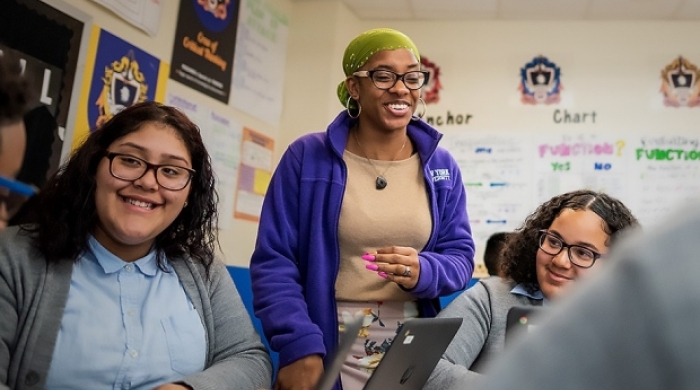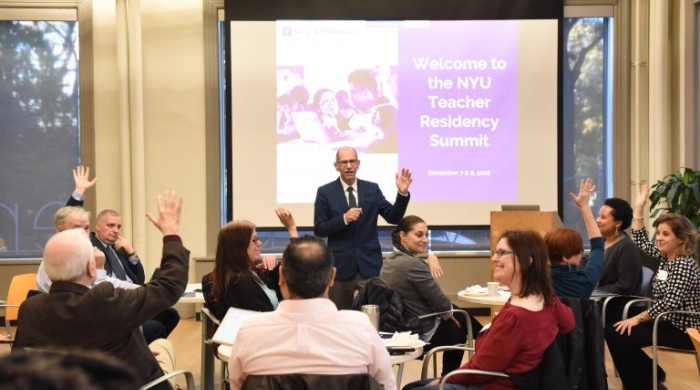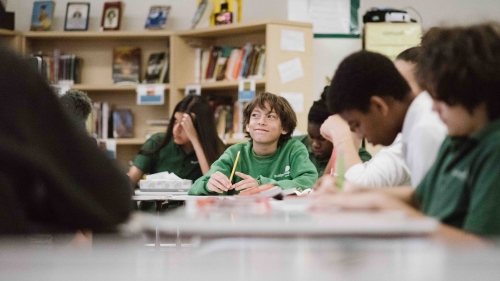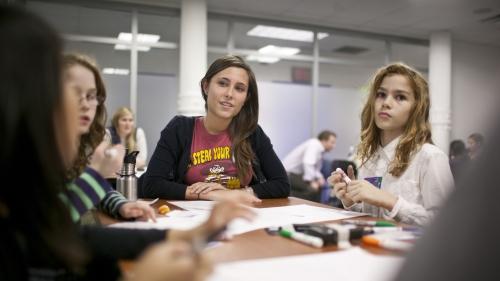In a country where only around 20 percent of public school teachers identify as Black, Indigenous, and People of Color (BIPOC), NYU Steinhardt’s innovative Teacher Residency program is dedicated to inclusion and representation in education.
This unique program is a one-year combined residency and online Master of Arts in Teaching (MAT) in which aspiring educators build equity-based, student-focused pedagogical skills while developing their craft as expert teachers in their content areas. Courses are offered online and at night to allow students — called “residents” — to gain hands-on experience in classrooms in district and charter schools across the country, including New York, Florida, Connecticut, and Washington, D.C.
On average, more than 60 percent of Teacher Residency students are BIPOC, with 80 percent of the residents in the Inclusive Childhood branch of the Residency identifying this way. Research shows that all K–12 students, and especially those of color, benefit from having even one teacher of color along their educational journey, from better academic achievement to higher college attendance and completion rates.
A.C. Butler (MAT ’21) began his NYU Steinhardt Teacher Residency program in his home state of Arizona before moving to Syracuse, NY, for his residency. Butler chose Syracuse because most students in the district are Black; growing up, he was one of only two Black kids in his school.
It inspires me every day to see a classroom of kids who look like me. In my classroom, we talk about things happening in our own community, like water safety and making sure the roads get fixed. I want to start conversations with my students as future civic leaders – yes, they’re only 12, but they have a stake in what’s happening in their neighborhoods, and they have a voice even as kids.
“I’ve known I wanted to be a social studies teacher since the second grade,” says Butler, who studied history at Arizona State University. “I decided to get my master’s degree to get a leg up and gain a better understanding of teaching, classroom management, and pedagogical approaches.”
Butler is currently in his second fulfillment year at Lincoln Middle School, where he teaches social studies.
“It inspires me every day to see a classroom of kids who look like me,” says Butler. “In my classroom, we talk about things happening in our own community, like water safety and making sure the roads get fixed. I want to start conversations with my students as future civic leaders – yes, they’re only 12, but they have a stake in what’s happening in their neighborhoods, and they have a voice even as kids. I want to prepare them for this kind of thinking when they’re adults.”
Filling the Growing Gap of Trained Teachers
The Teacher Residency program has a distinctive funding model in which residents receive a stipend while obtaining their degree. This financial support comes from both Steinhardt and the partner schools in which students learn and work. As their preparation year progresses, residents gradually take on more teaching responsibility, ultimately acting in the role of lead teachers while being mentored by a master teacher. In addition to this direct pedagogical practice, students also benefit from close mentorship and coaching from existing teachers, as well as from NYU Steinhardt Residency Directors and Content Mentors.
“Our residency schools are partners in this funding because they are invested in our students’ success; Teacher Residency students very much become a part of their school community,” says Diana Turk, co-director of the program and associate professor and chair of Steinhardt’s Department of Teaching and Learning. “In most cases after graduation, students continue teaching for at least several years in their residency school or district.”
Neann Genato (MAT ’20) was working as a respiratory therapist in California when she decided she wanted to become a teacher and went back to school to finish her bachelor’s degree. She took a job as an instructional assistant for students with disabilities to gain some classroom experience and began looking into special education programs.
“Most teaching programs in California are two years and you only get one semester in the classroom,” says Genato. “When I found out that the Teacher Residency was a one-year program with a paid, full year of teaching experience at a great school district close to home, it all fell into place for me.”
The program also appealed to Genato because of her interest in working to improve accessibility and equitable practices for students with disabilities and in underserved communities, celebrating culture and diversity in the classroom. She completed her residency in California and began teaching right away in a neighboring district — just in time for schools to close for the COVID-19 pandemic.
NYU Steinhardt's Teacher Residency program is preparing teachers who can bring a justice lens to reaching, teaching, and supporting the growth and development of all learners. We are coaching and preparing teachers to be equitable, kind humans who encourage deep and rigorous academic growth at the same time as they support social and emotional learning in their students. That starts and ends with forming meaningful relationships within the communities they serve.
“I had to start my first year as a teacher online, but my experiences through the online program with NYU Steinhardt allowed that transition to be beneficial for me and my students,” says Genato, who is currently a special education teacher in the Chaffey Joint Union High School District. “I was an asset to the school because I was able to adapt to what the community needed — in-person, online, or hybrid education — helping teachers, parents, and students access education during a challenging time.”
“We are extremely intentional about forming an online community where people feel more connected,” says Turk. “Most of the work is synchronous, and that helps students form strong connections with each other, which in turn helps them build support networks and connections as they go out into teaching in their specific content areas. At the same time, they learn through the work we do how to build their own relationships with students and other faculty. We spend a lot of time on relationship building for this reason.”
In the recruitment and enrollment of students, the Teacher Residency program focuses on people who view teaching as a career, and particularly those who also want to contribute to underserved schools and communities. Ninety-five percent of the program’s partner schools receive Title I funding, meaning that they serve a high percentage of students who qualify for free and reduced lunch, so residents work with K–12 students who live with a variety of injustices, from impacts of the pandemic to racism to poverty.
“NYU Steinhardt's Teacher Residency program is preparing teachers who can bring a justice lens to reaching, teaching, and supporting the growth and development of all learners,” says Turk. “We are coaching and preparing teachers to be equitable, kind humans who encourage deep and rigorous academic growth at the same time as they support social and emotional learning in their students. That starts and ends with forming meaningful relationships within the communities they serve.”
Related Articles
NYU Steinhardt Teacher Residency Launches Part-Time Option, Continues to Expand
New York University’s year-long teacher residency program is adding a part-time or “half-day” residency option to support more nontraditional students.
NYU Steinhardt Teacher Residency Continues to Expand Partnerships with NYC Charter School Summit
Leadership representatives from 10 New York City charter school organizations gathered last month to learn more about partnering with NYU Steinhardt as part of its innovative model for teacher prep, the Teacher Residency master of arts in teaching (MAT) program.
NYU Steinhardt Ranks #4 Among Best Graduate Schools of Education
US News & World Report ranks NYU Steinhardt the #4 best graduate school of education in the nation.





